- Home
- Tony Hillerman
Hunting Badger jlajc-14 Page 7
Hunting Badger jlajc-14 Read online
Page 7
Chee spent a moment considering what Bernie had said. Then he erased calls one, three and four, leaving the Largo call (in case the captain needed to think he hadn’t heard it). Why would Nakai be in the hospital? It was hard to imagine that. He was dying of lung cancer, but he would never, never want to die in a hospital. Nakai was an ultra-traditional. A famous yataalii, a shaman who sang the Blessing Way, the Mountain Top Chant, the Night Way, and other curing ceremonials. As the older brother of Chee’s mother, he was Chee’s ‘little father,' the one who had given Chee his secret 'war name,' his mentor, the tutor who had tried to teach Chee to be a singer himself. Hosteen Nakai would hate being in a hospital. Dying in such a place would be intolerable for him. How could this have happened? Blue Woman was smart and tough. How could she have allowed anyone to take her husband from their place in the Chuska Mountains?
He was trying to think of an answer to that when he heard the sound of tires on gravel, looked up and saw through the screen door Bernie’s pickup rolling to a stop. Maybe she could tell him.
She couldn’t.
“I just happened to see him,” Bernie said. “They rolled him up on a gurney to where I was waiting for the elevator, and I thought he looked like your uncle, so I asked him if he was Hosteen Nakai, and he nodded, and I told him I worked with you, and he reached out for my arm and said to tell you to come, and I said I would, and then he said to tell you to come right away. And then the elevator came, and they put him on it.“ Bernie shook her head, her expression sad. “He looked bad.”
“That was all he said? Just for me to hurry and come?”
She nodded again. “I went back to the nursing station and asked. The nurse said they had put him in Intensive Care. She said it was lung cancer.”
“Yes,” Chee said. “Did she say how he got there?”
“She said an ambulance had brought him in. I guess his wife checked him in.“ She paused, looked at Chee, down at her hands and at him again. “The nurse said it was terminal. He had a tube in his arm and an oxygen thing.”
“It’s been terminal a long time,” Chee said. “Cancer. Another victim of the demon cigarette. Last time I saw him they thought he had just a few weeks to live and that was -" He stopped, thinking it had been months. Far too long. He felt shame for that—for violating the bedrock rule of the Navajo culture and putting his own interests ahead of family needs. Bernie was watching him, awaiting the end of his sentence. Looking slightly untidy as usual, and worried, and a little shy, wearing jeans stiff with newness and a bit too large for her and a shirt which fit the same description. A pretty girl, and nice, Chee thought, and found himself comparing her with Janet. Comparing pretty with beautiful, cute with classy, a sheep-camp woman with high society. He sighed. “That was far too long ago,” he concluded, and looked at his watch.
“They have evening visiting hours,” he said, and got up. “Maybe I can make it by then.”
“I wanted to tell you I talked to Cowboy Dashee,” Bernie said. “He told me what you did.”
“Did? You mean the airplane?”
“Yes,” she said, looking embarrassed. “That was a lot of work for you. You were sweet to do all that.”
“Oh,” Chee said. “Well. It was mostly luck.”
“I guess that was the big reason they were holding Teddy. Because he could fly. And he knew the man who had the plane. I owe you a big favor now. I didn’t really mean to ask you to do all that work. I just wanted you to tell me what to do.”
“I was going to ask why you were at the hospital. Seeing about Teddy Bai, I guess.”
“He’s better now,” she said. “They moved him out of Intensive Care.”
“I didn’t know Bai knew Eldon Timms,” Chee said. “Did you know that?”
“Janet Pete told me,” Bernie said. “She was at the hospital. She was appointed to represent Teddy.”
“Oh,” Chee said. Of course. Janet was a lawyer in the federal court public defender’s office. Bai was a Navajo. So was Janet, by her father’s name and her father’s blood if not by conditioning. Naturally, they’d give her Bai’s case.
Bernie was studying him. “She asked about you.”
“Oh?”
“I told her you were on vacation. Just back from going fishing up in Alaska.”
“Uh, what did she say to that?”
“She just sort of laughed. And she said she’d heard you had a hand in finding that airplane. Said she guessed you must have been doing that on your own time. I hadn’t talked to Cowboy yet, and I didn’t know about that, so I just said, well anyway you hadn’t gone back to work yet. And she laughed again, and said she thought getting egg on the FBI’s face had become sort of a hobby with you.”
Chee picked up his hat. “It’s not,” he said. “Lot of good people in the Bureau. It’s just they let the FBI get way too big. And the politicians get the promotions, and so they’re the ones making the policies and calling the shots instead of the bright ones. And so a lot of stupid things happen.”
“Like evacuating Bluff in that big manhunt of ninety-eight,” Bernie said.
Chee held the door open for her.
Bernie stood there looking at him, in no hurry to leave.
“Would you like to go along?” Chee asked. “Go see Hosteen Nakai with me?”
Bernie’s expression said she would.
“Could I help?”
“Maybe. Be good company anyway. And you could bring me up to date on what I’ve been missing here.”
But Bernie wasn’t very good company. As soon as she climbed into his pickup and shut the door behind her, he said, “You mentioned Janet asked about me at the hospital. What else did she say?”
Bernie looked at him a moment. “About you?”
“Yeah,” Chee said, wishing he hadn’t asked that question.
She thought for a moment, either about what Janet Pete had said about him, or about what she was willing to tell him.
“Just what I told you already, about you liking to embarrass the FBI,” she said.
After that there wasn’t much talking during the thirty-mile drive to the hospital.
Visiting hours were almost over when they pulled into the parking lot, and the traffic was mostly outgoing.
“I was noticing faces,” Bernie said. “The ones who had good news and the ones who didn’t. Not many of them looked happy.”
“Yeah,” Chee said, thinking of how he could apologize to Hosteen Nakai for neglecting him, trying to come up with the right words.
“Hospitals are always so sad,” Bernie said. “Except for the maternity ward.”
It took only a glance at the nurse manning the desk on the floor housing the Intensive Care ward to support Bernie’s observation. She was talking on a desk telephone, a graying, middle-aged woman whose face and voice reflected sorrow.
“Did he say when? OK." She glanced up at Chee and Bernie, gave the 'just a moment' signal, and said, "When he checks in tell him the Morris boy died." She hung up, made a wry face, and replaced it with a question.
“We’ve come to see Mr Frank Sam Nakai,” Chee said.
“He may not be awake,” she said, and glanced at the clock. “Visiting hours end at eight. You’ll have to make it brief.”
“He sent a message,” Chee said. “He asked me to come right away.”
“Let’s see then,” she said, and led them down the hall.
It was hard to tell whether Nakai was awake, or even alive. Much of his face was covered with a breathing mask, and he lay absolutely still.
“I think he’s sleeping,” Bernie said, and as she said it, Nakai’s eyes opened. He turned his face toward them and removed the mask.
“Long Thinker has come,” he said, in Navajo and in a voice almost too weak to be audible.
“Yes, Little Father,” Chee said. “I am here. I should have come long ago.”
A slender translucent tube connected Hosteen Nakai to a plastic container hung on a bedside stand. Nakai’s fingers followed the tube
along the sheet to his arm. Not the burly arm Chee remembered. Not much more than a bone covered with dry skin.
“I will go away soon,” Nakai said. He spoke with his eyes closed, in slow, careful Navajo. “The in-standing wind will be leaving me, and I will follow it to another place." He tapped his forearm with a finger. “Nothing will be left here but these old bones then. Before that, I must tell something. There is something I left unfinished. I must give you the last of your lessons.”
“Lesson?” Chee asked, but instantly he knew what Nakai meant. Years ago, when Chee had still believed he could be both a Navajo Policeman and a hataalii, Nakai had been teaching him how to do the Night Way ceremony. Chee had memorized the actions of the Holy People involved in myth and how to reproduce this story in the sand paintings. He’d sung the chants that told the story. He’d learned the formula for the emetic required, how to handle the patient, everything required to produce the magic that would compel the Holy People to end the sickness and restore the harmony of natural life. Everything except the last lesson.
The tradition of Navajo shamanism required that. The teacher withheld the ultimate secret until he was certain the student was ready for it. For Chee, that moment had never come. Once he had gone away to Virginia to study at the FBI Academy, once he had flown to Los Angeles to work on a case, once he’d gone to Nakai’s winter hogan to be tutored and Nakai had said the season and the weather were wrong for it. Finally, Chee had concluded that Nakai had seen that he would never be ready to sing the Night Way. He had been hurt by that. He had suspected that Nakai disapproved of assimilation of the white man’s ways, of his plan to marry Janet Pete, had understood that having a Navajo father would never prepare her for the sacrifices required of a shaman’s wife. Whatever the reason, Chee had respected Nakai’s wisdom. He would have to forget that boyhood dream. He was not to be entrusted the power to cure. He had come to accept that.
But now—? Had Nakai changed his mind? What could he say?
“Here?” he said. He gestured at the white, sterile walls. “Could you do that here?”
“A bad place,” Nakai said. “Many people have died here, and many are sick and unhappy. I hear them crying in the hallway. And the chindi of the dead are trapped within its walls. I hear them, too. Even when they give me the medicine that makes me sleep, I hear them. What I must teach you should be done in a holy place, far away from evil. But we have no choice.”
He replaced the mask over his face, inhaled oxygen, and removed it again.
“The bilagaana do not understand death,” he said. “It is the other end of the circle, not something that should be fought and struggled against. Have you noticed that people die just at the end of night, when the stars are still shining in the west and you can sense the brightness of Dawn Boy on the eastern mountains? That’s so Holy Wind within them can go to bless the new day. I always thought I would die like that. In the summer. At our camp in the Chuskas. With the stars above me. With my instanding wind blowing free. Not dying trapped in-"
Nakai’s voice had become so faint that Chee couldn’t understand the last words. Then it faded into silence.
Chee felt Bernie’s touch at his elbow.
“Jim. If this is something ceremonial, shouldn’t I leave?”
“I guess so,” Chee said. “I really don’t know.”
They stood, watching Nakai, his eyes closed now.
Chee replaced the oxygen mask over his face, felt Bernie’s touch on his elbow.
“He hates this place,” Bernie said. “Let’s get him out of here.”
“What do you mean?” Chee said. “How?”
“We tell the nurse we’re taking him home. And then we take him home.”
“What about all that?” Chee asked, pointing at the oxygen mask, the tubes that tied Nakai to life, and the wires that linked him to the computers which measured the Holy Wind within him and reduced it to electronic blips racing across television screens. “He’ll die.”
“Of course he’ll die,” Bernie said, her tone impatient. “That’s what the nurse told us. He’s dying right now. That’s what he was telling you. But he doesn’t want to die here.”
“You’re right,” Chee said. “But how do -"
But Bernie was walking out. “First, I call the ambulance service,” she said. “While they’re coming I’ll start trying to check him out.”
It was not quite as simple as Bernie made it sound. The nurse was sympathetic but had questions to be answered. For example, where was Nakai’s wife, whose name, but not her signature, was on the admissions form? By what authority were they taking Mr Nakai off the life-support systems and out of the hospital? The doctor who had admitted Mr Nakai had left for Albuquerque. That shifted responsibility to another doctor—now busy in the emergency room downstairs patching up a knifing victim. He arrived on the floor thirty minutes and two paging calls later, looking young and tired.
“What’s this about?” he asked, and the nurse provided a fill-in that caused him to look doubtful. Meanwhile, the ambulance attendant emerged from the elevator, recognized Chee from working traffic accidents and asked him for instructions.
“I can’t do it,” the doctor said. “The patient’s on life support. We need authorization from the next of kin. Lacking that, the admitting physician needs to sign him out.”
“That’s not really the question,” Chee said. “We are taking Hosteen Nakai home tonight to be with his wife. Our question is how you can help us do this to minimize the trouble it might cause.”
That produced a chilly but brief silence followed by the signing by Chee of a Released Against Advice of Physician form and a financial responsibility statement. Then Hosteen Frank Sam Nakai was free again.
Chee rode in the back of the ambulance with Nakai and the emergency medical technician.
“I guess you heard they got one of those casino bandits,” the tech said. “It was on the six o’clock news.”
“No,” Chee said. “What happened?”
“The guy shot himself,” the tech said. “It was that fella that used to have a radio talk show. Sort of a right’winger. News said he ran cattle up there south of Aneth. Married a Navajo woman and was using her grazing allotment up there.”
“Shot himself? What’d they say about that?”
“Not much. It was at his house. I guess they were closing in on him, and he didn’t want to get arrested. Fella named Everett Jorie. And now they know who the other two were. Said they’re both from up there in Utah. Part of one of those militia bunches.”
“Jorie,” Chee said. “Never heard of him.”
“He used to have a talk show on the radio. You know, all the nuts calling in and complaining about the government.”
“OK. I remember him now.”
“And they have the other two identified now. Man named George Ironhand and one named Buddy Baker. I think Ironhand’s a Ute. Anyway, they said he used to work at the Ute Casino.”
“I wonder how they got them identified.”
“The TV said the FBI did it, but it didn’t say how.”
“Well, hell,” Chee said. “I was hoping they’d catch them in Los Angeles, or Tulsa, or Miami, or anyplace a long ways from this place.”
The ambulance tech chuckled. “You’re not anxious to go prowling around in those canyons again. I wouldn’t be, either.”
Chee let that pass into silence.
Then Hosteen Nakai sighed, and said, “Ironhand.” And sighed again.
Chee leaned over him, and said, “Little Father. Are you all right?”
“Ironhand,” Nakai said. “Be careful of him. He was a witch.”
“A witch? What did he do?”
But Hosteen Nakai seemed to be sleeping again.
Chapter Eleven
The half-moon was dipping behind the mountains to the west when the ambulance, with Bernie trailing it in Chee’s truck, rolled down the track and stopped outside Hosteen Nakai’s sheep-camp place in the Chuskas. Blue Woman was standing
in the doorway waiting. She ran out to greet them, crying. At first the tears were for grief, thinking they were bringing home her husband’s body. Then she cried for joy.
They put him on his bed beside a pinion tree, rearranged his oxygen supply and listened to Blue Woman’s tearful explanation of how Hosteen Nakai had come to be abandoned, as she saw it, in the Farmington hospital. Her niece had come to take her to have an infected tooth removed, and to replenish the supply of the medicine which kept away the pain and let her husband sleep. Nakai had been much better, had wanted to come along and there had been no one to look after him at the sheep camp. But at the dentist’s office he had fainted, someone called 911, and an ambulance took him to the hospital. She had waited there, and waited, not knowing what to do for him, and finally her niece had to go to care for her children, and she had to go with her. There were stories that the rich young people from the cities were putting wolves back in the mountains, and there was no one at their place to protect their young lambs.
Nakai was awake now, listening to all this. When Blue Woman was finished, he motioned to Chee.
“I have something to tell you,” he said. “A story.”
“We will make some coffee,” Blue Woman said. She led Bernie away to the hogan, and as they left Nakai began his tale.
It would be long, Chee thought, involving the intricacies of Navajo theology, the relationship of the universal creator who set all nature in its harmonious motion to the spirit world of the Holy People, and to humanity, and when it was finished he would know the final secret that would qualify him as a shaman.
“I think you will be going into the canyon soon to hunt the men who killed the policemen,” Nakai said. “I must tell you a story about Ironhand. I think you must be very, very careful.”
Chee exhaled a long breath. Wrong again, he thought.
“A long time ago when I was a boy, and the winter stories were being told in the hogan, and people were talking about the great dam that was going to make Lake Powell, and how the water of the Colorado and the San Juan were backing up and drowning the canyons, the old men would talk about how the Utes and the Paiutes would come through the canyons in their secret ways, and steal the sheep and horses of our people, and kill them, too. And the worst of these was a Paiute they called Dobby, and the band that followed him. And the worst of the Utes was a man they called Ironhand.”

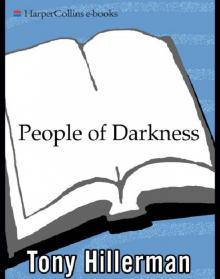 People of Darkness
People of Darkness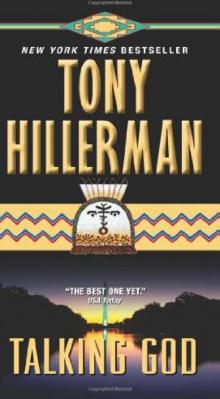 Talking God jlajc-9
Talking God jlajc-9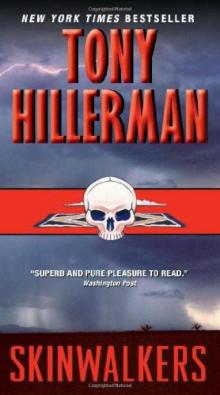 Skinwalkers jlajc-7
Skinwalkers jlajc-7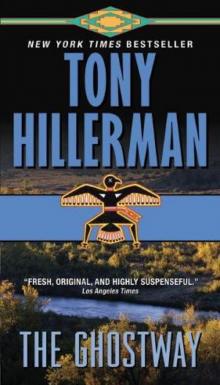 The Ghostway jlajc-6
The Ghostway jlajc-6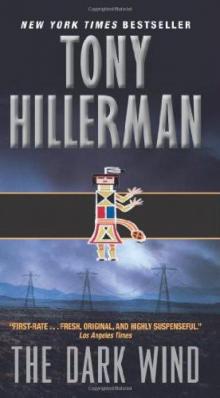 The Dark Wind jlajc-5
The Dark Wind jlajc-5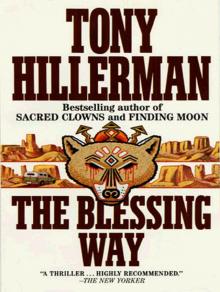 The Blessing Way
The Blessing Way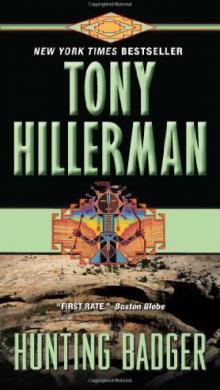 Hunting Badger jlajc-14
Hunting Badger jlajc-14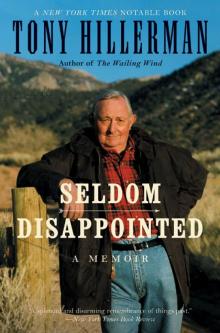 Seldom Disappointed: A Memoir
Seldom Disappointed: A Memoir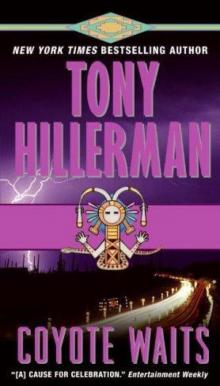 Coyote Waits jlajc-10
Coyote Waits jlajc-10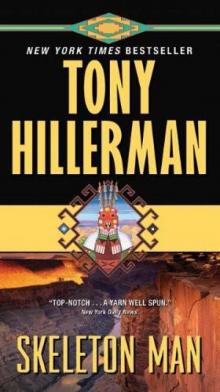 Skeleton Man jlajc-17
Skeleton Man jlajc-17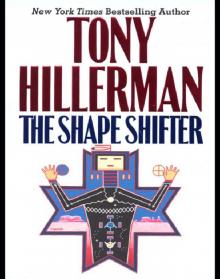 The Shape Shifter
The Shape Shifter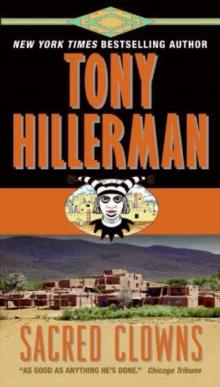 Sacred Clowns jlajc-11
Sacred Clowns jlajc-11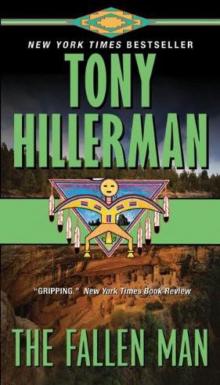 The Fallen Man jlajc-12
The Fallen Man jlajc-12 The First Eagle jlajc-13
The First Eagle jlajc-13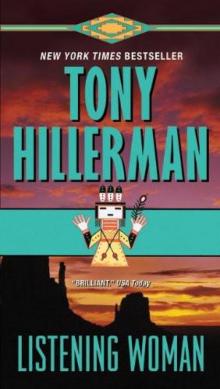 Listening Woman jlajc-3
Listening Woman jlajc-3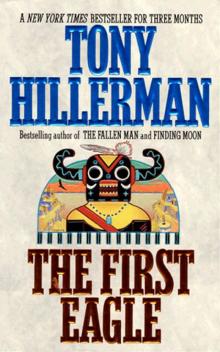 The First Eagle
The First Eagle Skeleton Man
Skeleton Man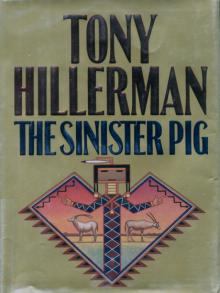 The Sinister Pig jlajc-16
The Sinister Pig jlajc-16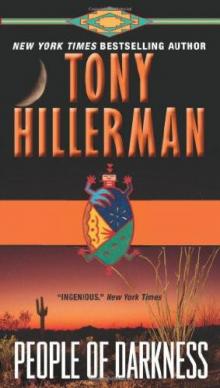 People of Darkness jlajc-4
People of Darkness jlajc-4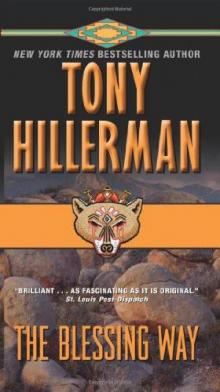 The Blessing Way jlajc-1
The Blessing Way jlajc-1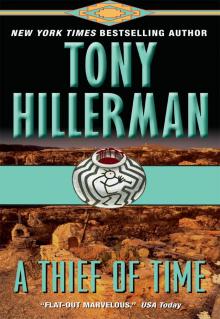 A Thief of Time
A Thief of Time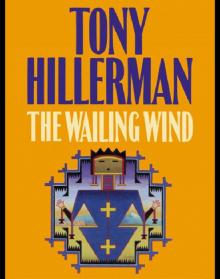 The Wailing Wind
The Wailing Wind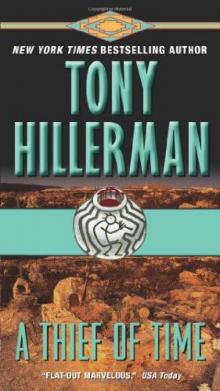 A Thief of Time jlajc-8
A Thief of Time jlajc-8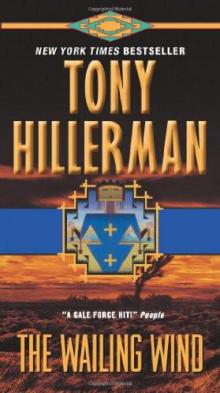 The Wailing Wind jlajc-15
The Wailing Wind jlajc-15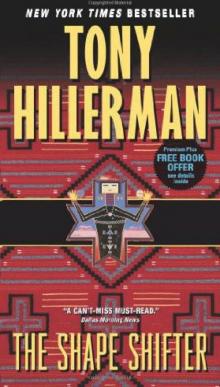 The Shape Shifter jlajc-18
The Shape Shifter jlajc-18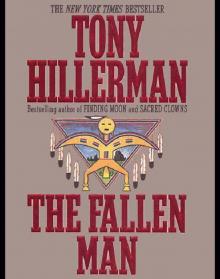 The Fallen Man
The Fallen Man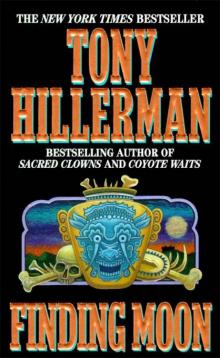 Finding Moon
Finding Moon